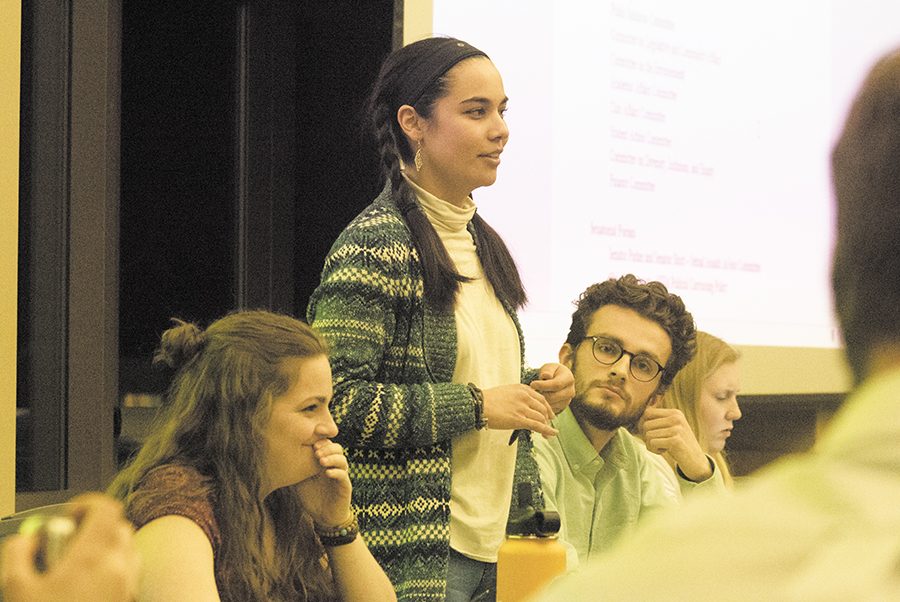Campus canvassing policy to be reevaluated by SGA
Senior Gillian Natanagara offers a statement April 2 at a SGA meeting. SGA will be voting to create a working group evaluating revisions to the canvassing ban to allow for more involvement in student politics.
April 16, 2019
Students on campus may expect more knocks on their doors following new SGA legislation on canvassing.
SGA will be voting to create a working group reevaluating the campus canvassing ban to allow for more involvement in student politics, said senior Maeve McDermott, chair of SGA’s Committee on Legislative and Community Affairs.
Student privacy and safety are high priorities when considering policy changes, McDermott said.
She feels it makes sense to create a controlled way for students to canvass while ensuring students’ privacy and safety, she said.
“If we open up the residence halls to political campaigns, any political campaigns can come in. That’s your home in the residence hall, so finding that line where we can allow [canvassing] but not hurt students inadvertently,” McDermott said.
Senior Carter Neubieser, on behalf of the Young Progressives of Vermont, approached SGA about wanting to change the policy to allow for more grassroots organizing and student involvement through canvassing, McDermott said.
Neubieser canvassed in the dorms in early 2018 while campaigning for City Council, drawing criticism from SGA at the time, according to a March 2018 Cynic article.
Neubieser believes that, despite the intentions behind the canvassing policy, it discourages grassroots organizing among students, he said.
Many other universities, such as the University of Connecticut, have policies allowing for canvassing in the dorms, which provide a tested precedent UVM can follow, Neubieser said.
“It is just essential to democratic progress to be able to give students a voice and to advocate for ourselves,” he said. “Regardless of what specific policy comes out, we have dozens and dozens of models at other universities to look at.”
Restrictions on canvassing are being considered, like restricting the dates and times that canvassing in residence halls is allowed or allowing students to signal if they do not wish to be canvassed, McDermott said.
If the policy is revised to allow door-to-door campaigning, canvassers may be required to check in at the front desk, live in the building or only canvas during certain times, McDermott said.
The University is within its right to allow or not allow canvassing of the dorms, McDermott said.
Rafael Rodriguez, executive director of Residential Life; Joe Speidel, director of local government and community relations; and a legal expert have met with some SGA members to discuss this topic, she said.
A student’s room is one of the most sacred places for a resident, Rodriguez said, and Res Life tries to protect the privacy of a student’s room as much as possible.
“We are always fielding feedback and concerns from students expressing their discomfort of having unknown and unfamiliar individuals in the community,” Rodriguez said.
Opening dorms to this activity means it needs to be open to all kinds of that activity, including campaigns that make some students uncomfortable, he said.
The final say about changes to this policy will come down to the UVM administration, Rodriguez said. In the past, Residential Life has worked with SGA about changes to some policies, he said.
Rodriquez does not anticipate at this time that the policy will be changed, he said.
“I don’t think that’s where we’re at right now,” Rodriquez said. “The implications and the interests for this are broad. There is Residential Life, but there is also tax implications for the institution and for external relations.”
Speidel did not reply in time for publication.








